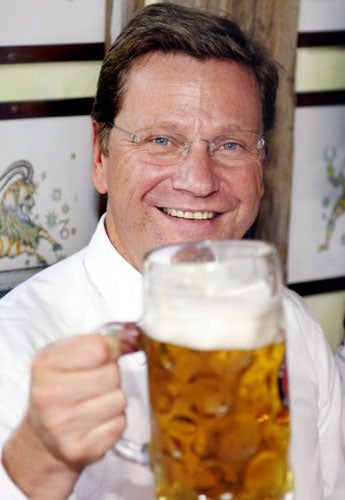Economy holds key as Germany prepares to vote with its pockets
Angela Merkel has been praised for her calm in the face of the global downturn, but she may have to be more radical to win power again

Support truly
independent journalism
Our mission is to deliver unbiased, fact-based reporting that holds power to account and exposes the truth.
Whether $5 or $50, every contribution counts.
Support us to deliver journalism without an agenda.

Louise Thomas
Editor
The demand to pull troops out of a distant war suddenly brought a tedious German election campaign alive three weeks ago, after a Bundeswehr officer called in an air strike that killed dozens of Afghans.
But the real battleground of this election – and the one which will dictate the decision of many voters – is the stuttering economy. Germany, with France, may be leading the eurozone out of recession, but there is pervasive scepticism that better times lie ahead.
What makes the voting calculation more complicated than simply left versus right, state invention versus free market, is Germany's sharp regional differentiation and the shades of political choice on offer.
To travel from Duisburg, the steel city in the languishing Ruhr industrial region, to Stuttgart in the heart of Germany's modern manufacturing sector (think Mercedes and Bosch) is to leave behind visible deprivation in a cold climate and reach prosperity in a sun-kissed south. But appearances are as deceptive as – perhaps – what the voters are telling the pollsters. Manufacturing, even when it encompasses the world-beating companies of Baden-Württemberg, has suffered grievously from weak demand in its export markets and there are fears that employers are just waiting out the election campaign before making swingeing redundancies.
Why might they be doing that? Because German business is hoping against hope that Angela Merkel's centre-right alliance and the free-market Free Democrats will do well enough between them to form a new coalition. Ms Merkel would be able to say danke and auf wiedersehen to her Social Democrat partners in the present "grand coalition" and embrace a programme of tax cuts and de-regulation to get German business moving. That, at least, is what the Free Democrats, under Guido Westerwelle, are promising.
Ms Merkel's coalition of the centre-left and centre-right has earned grudging respect for steering Germany through the banking crisis with little damage. But much of the credit has attached to Ms Merkel personally and what is seen as her calm, competent management, rather than to her coalition.
It is not only the disgruntled Ruhr workers who are looking for more radical solutions – many have been without work for so long they have given up on the mainstream Social Democrats and are flirting with the further-left Linke. It is also the highly skilled, and once well-paid workers of Baden-Württemberg.
Some 300,000 in the region are working shorter hours (a three-day week, perhaps, or a two-week month), the idea being not to discard manpower that will be needed in the upturn. But their lower incomes have a knock-on effect on the rest of the economy and not everyone is convinced that they will benefit from the upturn.
Small business also harbours sceptics about any improvement in the economic climate, and they resent what they see as the feather-bedding that Ms Merkel's coalition provided to the banks and big employers when the crisis hit. The Free Democrats are capitalising on the frustrations of this middle-income sector but also on widespread weariness with Germany's complex tax regime. The party advocates lower, simpler taxation, which would free households on less than €40,000 (£36,000) a year from paying income tax at all.
In the economy more than anywhere else, the outgoing Merkel coalition is caught between being not left-wing enough for some, and not free-market enough for others. There are others, of course, who say that, for this very reason, its course was probably just about right. How many there are will become apparent after the polls close on Sunday.
Join our commenting forum
Join thought-provoking conversations, follow other Independent readers and see their replies
Comments